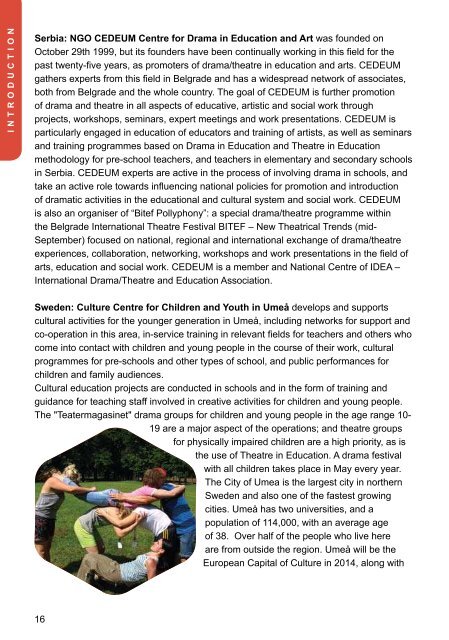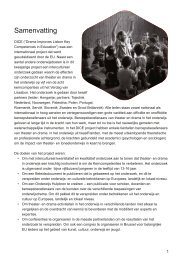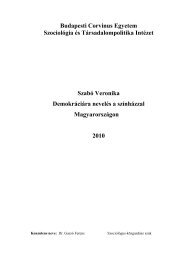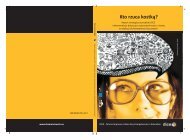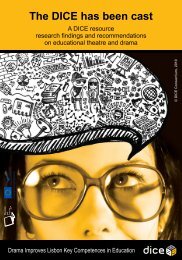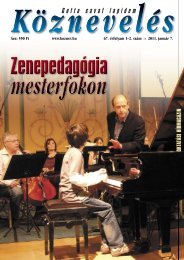Education Resource - Drama Improves Lisbon Key Competences in ...
Education Resource - Drama Improves Lisbon Key Competences in ...
Education Resource - Drama Improves Lisbon Key Competences in ...
- No tags were found...
Create successful ePaper yourself
Turn your PDF publications into a flip-book with our unique Google optimized e-Paper software.
IntroductionSerbia: NGO CEDEUM Centre for <strong>Drama</strong> <strong>in</strong> <strong>Education</strong> and Art was founded onOctober 29th 1999, but its founders have been cont<strong>in</strong>ually work<strong>in</strong>g <strong>in</strong> this field for thepast twenty-five years, as promoters of drama/theatre <strong>in</strong> education and arts. CEDEUMgathers experts from this field <strong>in</strong> Belgrade and has a widespread network of associates,both from Belgrade and the whole country. The goal of CEDEUM is further promotionof drama and theatre <strong>in</strong> all aspects of educative, artistic and social work throughprojects, workshops, sem<strong>in</strong>ars, expert meet<strong>in</strong>gs and work presentations. CEDEUM isparticularly engaged <strong>in</strong> education of educators and tra<strong>in</strong><strong>in</strong>g of artists, as well as sem<strong>in</strong>arsand tra<strong>in</strong><strong>in</strong>g programmes based on <strong>Drama</strong> <strong>in</strong> <strong>Education</strong> and Theatre <strong>in</strong> <strong>Education</strong>methodology for pre-school teachers, and teachers <strong>in</strong> elementary and secondary schools<strong>in</strong> Serbia. CEDEUM experts are active <strong>in</strong> the process of <strong>in</strong>volv<strong>in</strong>g drama <strong>in</strong> schools, andtake an active role towards <strong>in</strong>fluenc<strong>in</strong>g national policies for promotion and <strong>in</strong>troductionof dramatic activities <strong>in</strong> the educational and cultural system and social work. CEDEUMis also an organiser of “Bitef Pollyphony”: a special drama/theatre programme with<strong>in</strong>the Belgrade International Theatre Festival BITEF – New Theatrical Trends (mid-September) focused on national, regional and <strong>in</strong>ternational exchange of drama/theatreexperiences, collaboration, network<strong>in</strong>g, workshops and work presentations <strong>in</strong> the field ofarts, education and social work. CEDEUM is a member and National Centre of IDEA –International <strong>Drama</strong>/Theatre and <strong>Education</strong> Association.Sweden: Culture Centre for Children and Youth <strong>in</strong> Umeå develops and supportscultural activities for the younger generation <strong>in</strong> Umeå, <strong>in</strong>clud<strong>in</strong>g networks for support andco-operation <strong>in</strong> this area, <strong>in</strong>-service tra<strong>in</strong><strong>in</strong>g <strong>in</strong> relevant fields for teachers and others whocome <strong>in</strong>to contact with children and young people <strong>in</strong> the course of their work, culturalprogrammes for pre-schools and other types of school, and public performances forchildren and family audiences.Cultural education projects are conducted <strong>in</strong> schools and <strong>in</strong> the form of tra<strong>in</strong><strong>in</strong>g andguidance for teach<strong>in</strong>g staff <strong>in</strong>volved <strong>in</strong> creative activities for children and young people.The "Teatermagas<strong>in</strong>et" drama groups for children and young people <strong>in</strong> the age range 10-19 are a major aspect of the operations; and theatre groupsfor physically impaired children are a high priority, as isthe use of Theatre <strong>in</strong> <strong>Education</strong>. A drama festivalwith all children takes place <strong>in</strong> May every year.The City of Umea is the largest city <strong>in</strong> northernSweden and also one of the fastest grow<strong>in</strong>gcities. Umeå has two universities, and apopulation of 114,000, with an average ageof 38. Over half of the people who live hereare from outside the region. Umeå will be theEuropean Capital of Culture <strong>in</strong> 2014, along withRiga. Umeå wishes to establish itself as one of Europe´s many cultural capitals. A proud,forward-th<strong>in</strong>k<strong>in</strong>g city <strong>in</strong> an <strong>in</strong>tegrated and multifaceted Europe built on participationand co-creation, characterised by curiosity and passion. The program of Umeå 2014is <strong>in</strong>spired by the eight Sami seasons, and the year will entail many opportunities for<strong>in</strong>spir<strong>in</strong>g meet<strong>in</strong>gs and cultural exchanges.To contact any of the consortium members see Appendix C<strong>Education</strong>al Theatre and <strong>Drama</strong>– What is it?The children are watch<strong>in</strong>g a refugee girl, Amani, and a boy, George, <strong>in</strong>teract <strong>in</strong> a disusedrailway station. Amani and George are played by two actors <strong>in</strong> role. The <strong>in</strong>teraction isfraught with tension. Amani is frightened, George is aggressive - he is frightened too. Theycannot speak to each other. One of the pupils, a girl aged seven, a girl who is often quiet,distant even, taps one of the adults work<strong>in</strong>g <strong>in</strong> the programme on the shoulder. “I knowwhat the problem is”, she says. The adult gets the attention of the actor facilitat<strong>in</strong>g theprogramme, <strong>in</strong>dicat<strong>in</strong>g that the child is prepared to share her understand<strong>in</strong>g with the restof her peers. “His story is her story” she observes with quiet confidence, “and her story ishis story, but they don’t realise it.” The significance was apparent to everyone <strong>in</strong> the room,it was held <strong>in</strong> a portentous silence. The task for everyone <strong>in</strong>volved now was to deepen thisunderstand<strong>in</strong>g and share it with George and Amani. This was the stuff of real drama.Suitcase – a Theatre In <strong>Education</strong> programme for children aged 6-7 years oldThe drama of – As ifLet’s beg<strong>in</strong> with a broad def<strong>in</strong>ition of the mean<strong>in</strong>g of drama, which derives from the Greekword Dran – to do. <strong>Drama</strong> is someth<strong>in</strong>g of significance that is ‘done’ or enacted. In ourwork it is action explored <strong>in</strong> time and space <strong>in</strong> a fictional context.<strong>Drama</strong> and theatre is a shared experience among those <strong>in</strong>volved either as participant oraudience where they suspend disbelief and imag<strong>in</strong>e and behave as if they were otherthan themselves <strong>in</strong> some other place at another time. There are many aspects to theimag<strong>in</strong>ed experience of as if.<strong>Drama</strong> is a framed activity where role-tak<strong>in</strong>g allows the participants to th<strong>in</strong>k or/andbehave as if they were <strong>in</strong> a different context and to respond as if they were <strong>in</strong>volved <strong>in</strong>a different set of historical, social and <strong>in</strong>terpersonal relationships. This is the source ofdramatic tension. In drama we imag<strong>in</strong>e the real <strong>in</strong> order to explore the human condition.Introduction1617


